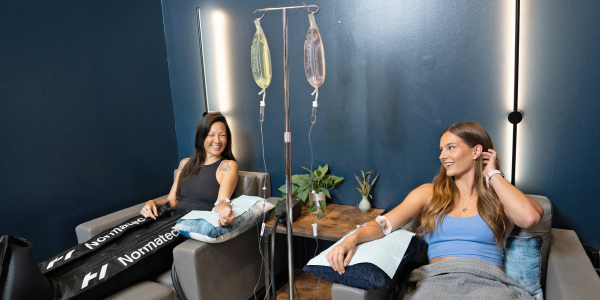B Vitamins are a group of eight essential nutrients that play a vital part in various functions throughout the body, including metabolizing food into energy, producing blood cells, supporting brain function and maintaining healthy skin.
Each of the eight types of B Vitamins has its own role, and a deficiency in any of the eight will produce varying symptoms that may include fatigue, confusion and health conditions like anemia.
What Causes Vitamin B Deficiency?
A deficiency in any of the B Vitamins may develop if someone isn’t getting enough of the nutrients through their diet or supplementation. This may also occur if their body is unable to properly absorb those nutrients due to medication or a health condition like type 1 diabetes, Celiac disease or certain thyroid disorders.
How Do You Prevent a Vitamin B Deficiency?
Each B Vitamin has a very important role, and they all depend on each other to do their job and provide the best health benefits. While eating a well-balanced diet can help increase your Vitamin B levels and prevent a deficiency, supplemental science-backed services like intravenous (IV) Drip Therapy and intramuscular (IM) Shots can be an extra tool in your arsenal.
IV Drip Therapy and IM Shots are safe, effective ways to deliver fluids and nutrients like B Vitamins straight to your bloodstream. Whereas eating certain foods can provide 15-20% bioavailability of nutrients, IV Drip Therapy can provide 100% bioavailability because the ingredients are delivered directly into your veins. With IM Shots, the nutrients are injected directly into the muscle tissue where they’re gradually absorbed into the bloodstream with 70-90% absorption. This therapy takes about 5 minutes, whereas IV Drip Therapy takes approximately 60 minutes. Due to their high bioavailability, both treatments can help ensure your body has the vitamins and minerals it needs.
Keep reading to learn more about B Vitamins, their deficiency symptoms and tips on how you can help prevent Vitamin B deficiencies with specific foods, IV Drip Therapy and IM Shots.
Vitamin B1 (Thiamin)
Vitamin B1, AKA Thiamin, is essential for metabolizing the food that you eat, converting it to energy and creating certain chemicals in the brain.
Symptoms of Deficiency
While Vitamin B1 deficiency is rare, symptoms may include loss of weight and appetite, heart and memory problems and tingling in your extremities.
Diet
Thiamin is naturally found in foods like fortified whole-grain bread and cereals, pork and fish, legumes, nuts and seeds.
Supplementation
Vitamin B1 is available as part of our B Complex ingredient (B1, B2, B3, B5, B6) for IV Drips or IM Shots.
Vitamin B2 (Riboflavin)
Vitamin B2, Riboflavin, aids in energy production, cell growth and development and converting amino acids into Vitamin B3 and Vitamin B6 into vital coenzymes the body needs.
Symptoms of Deficiency
A Vitamin B2 deficiency is also quite rare, but it may occur in those with an endocrine disorder, women who are pregnant and people who don’t eat dairy. Symptoms include hair loss, skin disorders and sores and cracks around the mouth.
Diet
Vitamin B2 is naturally found in eggs, organ meats, dairy like yogurt and milk, fortified cereals and grains and almonds.
Supplementation
Vitamin B2 is available as part of our B Complex ingredient (B1, B2, B3, B5, B6) for IV Drips or IM Shots.
Vitamin B3 (Niacin)
Adequate amounts of Vitamin B3, Niacin, are essential because it’s converted into a coenzyme called nicotinamide adenine dinucleotide (NAD), which plays a role in more than 400 different enzyme reactions throughout the body. Those enzymes support the metabolization of food into energy and communication between cells, like DNA expression and antioxidant function.
Symptoms of Deficiency
People deficient in Vitamin B3 may experience digestive issues, confusion, headaches, fatigue and depression.
Diet
Foods with niacin include animal products like meat, poultry and fish, as well as fortified breads and cereals, avocados, nuts and legumes.
Supplementation
Vitamin B3 is available as part of our B Complex ingredient (B1, B2, B3, B5, B6) for IV Drips or IM Shots.
Vitamin B5 (Pantothenic Acid)
Vitamin B5 is also known as Pantothenic Acid, and it functions to help the body create new proteins, fats and coenzymes. It’s carried throughout the body by red blood cells to be used for energy and metabolic processes.
Symptoms of Deficiency
Those with a Vitamin B5 deficiency may experience headache, fatigue, numbness and tingling of their hands and feet, digestion and sleep issues and irritability.
Diet
The foods highest in Vitamin B5 are eggs and milk, animal proteins like beef, poultry, and organ meat, vegetables like mushrooms, potatoes and broccoli, whole grains, nuts, seeds and legumes.
Supplementation
Vitamin B5 is available as part of our B Complex ingredient (B1, B2, B3, B5, B6) for IV Drips or IM Shots.
Vitamin B6 (Pyridoxine)
The body needs Vitamin B6, Pyridoxine, to perform more than 100 different enzyme reactions. These include immune system support, metabolic processes and brain development and function.
Symptoms of Deficiency
A Vitamin B6 deficiency may cause anemia, a weakened immune system, confusion, certain skin conditions, depression and irritability.
Diet
The best natural sources of Vitamin B6 are fish, organ meats, potatoes, fortified cereals, chickpeas, poultry and non-citrus fruits.
Supplementation
Vitamin B6 is available as part of our B Complex ingredient (B1, B2, B3, B5, B6) for IV Drips or IM Shots.
Vitamin B7 (Biotin)
Biotin, Vitamin B7, plays a critical part in skin and hair health, metabolic processes, cell communication and DNA regulation.
Symptoms of Deficiency
Signs of inadequate levels of Vitamin B7 include thinning hair, brittle nails, fatigue, certain skin conditions and depression.
Diet
The foods with the richest amount of B7 are eggs, legumes, organ meats, fruits like avocados and bananas, nuts and seeds and vegetables like broccoli, spinach and sweet potatoes.
Supplementation
Vitamin B7 is available for IV Drips or IM Shots.
Vitamin B9 (Folate)
Folate is the natural form of Vitamin B9, while folic acid is the vitamin’s synthetic form. Vitamin B9 is required for the metabolism of amino acids and vitamins, DNA replication and the proper division of cells. It’s also recommended that pregnant women supplement with folic acid to help prevent certain birth defects.
Symptoms of Deficiency
Deficiency in Vitamin B9 may result in weakness and fatigue, irritability, heart palpitations, headaches and changes in skin, hair and nails.
Diet
The best natural sources of Vitamin B9 include dark green leafy vegetables, beef liver, legumes, nuts, avocados, fortified bread and cereals, eggs, asparagus and Brussels sprouts.
Vitamin B12 (Cobalamin)
Vitamin B12 is essential for proper brain and nervous system function, red blood cell creation, metabolism and DNA synthesis.
Symptoms of Deficiency
When someone is deficient in Vitamin B12, it often leads to megaloblastic anemia, a condition that results in improper function of red blood cells. Symptoms include fatigue, loss of appetite and weight, memory problems, tingling of limbs and depression.
Diet
Foods that are richest in this vitamin include fish, meat, poultry, eggs and dairy products. Plant-based foods don’t naturally contain Vitamin B12, but it can still be found in fortified cereals and nutritional yeast.
Supplementation
Vitamin B12 is available for IV Drips or IM Shots.
Maximize Your Absorption
With a busy schedule, it’s not always easy to get all the nutrients you need to look and feel your best—both inside and out. Being deficient in any of the B Vitamins may result in a variety of symptoms that affect your overall well-being. Along with a healthy diet, IV Drip Therapy and IM Shots can help you do more of what you love, now and in the future.
Book your IV Drip and IM Shot appointments today!
Medical services are provided by an independently-owned physician practice. Some services may require medical clearance and a prescription. We reserve the right to refuse service to anyone. Services, therapies, ingredients and prices may vary per location. The content on our site, blog posts, educational materials, app, promotional newsletters, and any other written content are not intended to replace an evaluation with a qualified healthcare professional and are not intended as medical advice.






